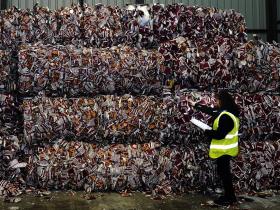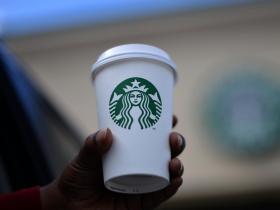A charge placed on disposable coffee cups in select Starbucks outlets has led to a 150 per cent increase in reusable cup use, according to a preliminary assessment by the company.
As part of the coffee giant’s efforts to tackle disposable coffee cup waste, it has added a 5p charge to all paper cups sold in 35 shops across parts of central and west London.
The increase, measured by the number of customers redeeming the 25p reusable cup discount, was observed just six weeks into the company’s three-month trial in the selected outlets.
- Read more
Costa Coffee pledges to recycle half a billion disposable cups a year
However, the proportion of customers bringing in their own cups is still fairly modest – only 5.9 per cent compared to 2.2 per cent in the same stores before the trial began.
All money made from the charge goes to environmental charity Hubbub.
“We are encouraged by the initial results of our trial that show that by charging 5p and increasing communication on this issue, we can help to reduce paper cup use,” said Jason Dunlop, chief operating officer of Starbucks EMEA.
“We look forward to sharing the full report on this cup charge trial, in collaboration with Hubbub, with the wider industry as we work together to find sustainable solutions.”
Ways to reduce your single-use plastic
Ways to reduce your single-use plastic
-
1/6 Plastic water bottle for a reusable beverage container
Instead of continually buying drinks in plastic bottles you can switch to a reusable beverage container and reduce your single-use of plastics. Selfridges' Bobble 550ml filtered water bottle costs £12.95 and includes a replaceable carbon filter that filters water as you drink, removing chlorine and organic contaminants in the process. You can buy it from selfridges.com
Getty/Selfridges
-
2/6 Coffee cup for a Travel coffee mug
It is estimated that the UK throws away around 2.5bn disposable coffee cups a year and almost all are incinerated, exported or sent to landfill because their plastic lining makes them expensive to recycle. The new Latte Levy in the UK means there will now be a 25p charge on every disposable coffee cup bought by consumers. Pret A Manger announced that it will double its discount to 50p in an effort to reduce waste. By swapping to a reusable cup you will be able to help cut the cost of disposable coffee cups. This Keep Cup Brew, cork edition, travel cup in Fika is just one of the many available to purchase. It fits under most commercial coffee machines, is splash-proof and ideal for transporting your coffee whilst on the go. You can buy this particular cup for £19.99 from trouva.com.
Getty/Trouva
-
3/6 Plastic bags for reusable cloth bags
An eco-friendly alternative to an ordinary plastic bag is this lightweight shopping bag. It comes with a practical pillowcase pocket and features a black and white ink splatter design. Convenient and durable it also has a matte black spring clip to attach it where you need it. You can buy this from paperchase.co.uk for just £5.00.
Getty/Paperchase
-
4/6 Coffee pods for a pot of coffee
Cut your plastic coffee pod usage with a cafetiere. This Barista and Co, 3 Cup Gold Cafetiere, from Habitat offers a simple way to brew and serve in style. Made from borosilicate glass and plated stainless steel with an ergonomically designed handle, the cafetiere is built to last and a pleasure to use; a fine metal filter produces a smooth coffee that retains its natural oils. You can buy it for £30 from habitat.co.uk.
Getty/Habitat
-
5/6 Balloons for eco-friendly decorations
Instead of using plastic balloons at your party try swapping them for some eco-friendly bunting. Handmade in Scotland, the bunting comprises thirteen brightly coloured pennants which spell out the words 'Happy Birthday', and uses lettering that has been printed onto 100 per cent recycled card. Included is 11ft of natural jute twine to hang the pennants on, and everything comes packaged in a cello bag. You can buy this bunting from Little Silverleaf on notonthehighstreet.com for £12.50.
Getty/notonthehighstreet
-
6/6 Plastic straw for a reusable bamboo one
Swap plastic straws for reusable ones made of bamboo. These straws are handmade in Bali and crafted by local balinese artisans. Made of organic and natural materials they are the best eco-friendly alternative to plastic, steel or glass straws. You can purchase them from Bali Boo on Amazon.co.uk for £13.99.
PA/Bali Boo/Amazon
The Independent’s Cut the Cup Waste campaign previously took to the streets to gauge public enthusiasm for Starbucks’ trial.
The general consensus was positive, a result that was consistent with an exclusive survey for The Independent that revealed 54 per cent of the British public supported to introduction of a “latte levy” by the government.
A latte levy – as proposed by the Environmental Audit Committee earlier this year – would consist of a 25p charge added to all disposable coffee cups sold in shops.
The aim of the charge would be to discourage people from using disposable coffee cups – which are lined with plastic and not widely recycled – and the money from the levy would go towards better waste management infrastructure.
- Read more
Starbucks pledges £7m to develop ‘fully recyclable cup'
Despite this support, ministers have so far indicated such a levy will not be introduced.
Starbucks has also pledged £7m to develop a “fully recyclable and compostable” cup following a campaign urging the company to fulfil a decade-old pledge to introduce 100 per cent recyclable coffee cups.
However, industry experts have pointed out that disposable cups are already recyclable, and the major hurdle that must be overcome is building the infrastructure to get them to appropriate waste management facilities.
The UK’s largest coffee chain, Costa Coffee, recently announced plans to fund the recycling of half a billion coffee cups a year by 2020 – the equivalent of all the cups it put on the market.
 Reuse contentRead the Original Article
Reuse contentRead the Original Article































